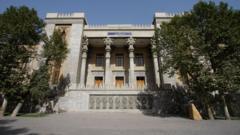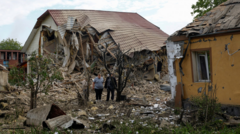As discussions between Iran and the US continue, Supreme Leader Khamenei has voiced skepticism regarding the possibility of a breakthrough agreement. He criticized US demands while reaffirming Iran's commitment to maintaining its nuclear capabilities, amidst warnings of military repercussions from the US if talks fail.
Khamenei Skeptical About US Nuclear Deal Progress Amidst Rising Tensions

Khamenei Skeptical About US Nuclear Deal Progress Amidst Rising Tensions
Iran's Supreme Leader, Ayatollah Ali Khamenei, expresses doubts over the effectiveness of ongoing nuclear discussions with the US, citing excessive demands on uranium enrichment.
In a recent ceremony commemorating late President Ebrahim Raisi, Iran's Supreme Leader Ayatollah Ali Khamenei conveyed serious doubts on the prospect of reaching a new nuclear agreement with the United States. Khamenei criticized what he termed as "excessive and outrageous" demands from the US regarding uranium enrichment, stating, "We don't think it will lead to any outcome. We don't know what will happen." This announcement comes as tensions persist following a week where US President Donald Trump claimed that Iran had "sort of" agreed to terms post four rounds of talks mediated by Oman since mid-April.
As discussions gear up for another round this weekend, Iran's chief negotiator dismissed Trump's claims that Iran must halt its production of enriched uranium, a capability that poses both reactor fuel options and risks of weapon creation. The backdrop to this contentious negotiation is Trump's controversial decision to withdraw from the 2015 nuclear deal during his presidency, which has led to heightened military threats aimed at Iran in the event of unsuccessful negotiations.
Iran maintains that its nuclear development is peaceful, denying intentions to develop or obtain nuclear weapons. However, since the reimposition of severe US sanctions seven years ago, Iran has gradually breached limits set by the previous nuclear deal and continues to stockpile uranium enriched to levels that could yield multiple bombs.
In his address, Khamenei praised Raisi's firm stance against engaging in direct negotiations with the US and declared that earlier talks under Raisi's predecessor, moderate cleric Hassan Rouhani, yielded no fruitful results. He emphasized the necessity for Iran to maintain its autonomy in negotiations, labeling Trump's team’s approach as inaccurate, particularly in their assertions surrounding enrichment capabilities.
US special envoy Steve Witkoff reiterated Washington's hardline stance against even minimal enrichment from Iran, emphasizing that any negotiation must begin with the assurance of a deal that includes no enrichment, suggesting that otherwise nuclear weaponization could become a reality.
Iran's Foreign Minister Abbas Araqchi swiftly dismissed Witkoff's remarks, warning that such unrealistic expectations could derail ongoing negotiations and reinforcing their position that enrichment is non-negotiable. The legacy of the 2015 agreement allowed Iran to limit its uranium enrichment to 3.67%, a significant reduction from its current levels, which have sparked concerns in the global community as the International Atomic Energy Agency recently indicated Iran has amassed uranium enriched to 60% purity, nearing the weapons-grade threshold.




















